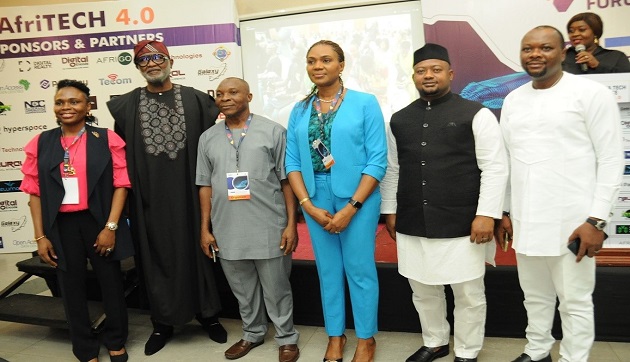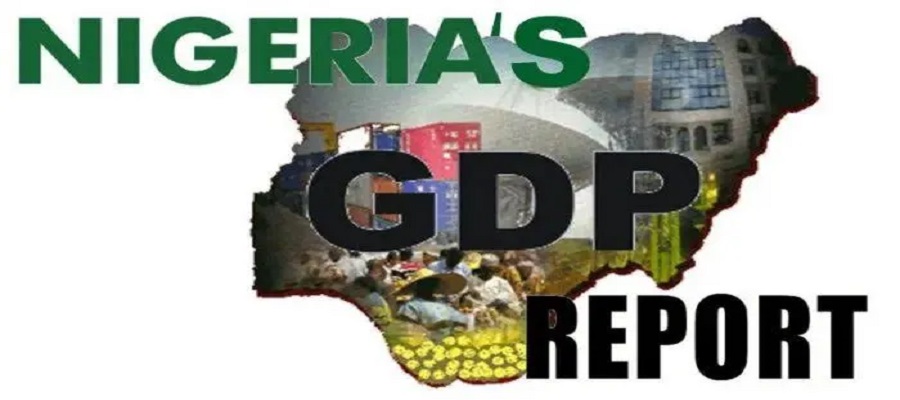News
Experts Highlight Blockchain, AI, eCommerce Potentials for Africa @ AfriTECH 4.0

Technology experts at the Africa Tech Alliance Forum (AfriTECH 4.0) held in Lagos State-Nigeria, recently, highlighted the transformative potential of blockchain and AI in positioning Africa as a global technology leader.

Kashifu Inuwa Abdullahi, the director-general of the National Information Technology Development Agency (NITDA), in his keynote address, titled “Blockchain Technology & AI: Positioning Africa for the Future,” emphasized Africa’s unique position to leverage these technologies for economic and social development.
With mobile penetration at about 80% and a rapidly growing youth population, Africa, he noted, is fertile ground for digital transformation, noting that Blockchain and AI offer unparalleled opportunities to propel Africa into the future as a leader in the global digital economy.
“Both blockchain and artificial intelligence are powerful technologies that offer Africa unprecedented opportunities. By strategically integrating these technologies, we can propel Africa forward as a dynamic leader in the global digital economy,” he said.
Abdullahi who was represented at the event by Mrs. Rita Shoremi, Head, Startup Innovations and IT solutions, NITDA, South West Zone, outlined the potential of blockchain to address challenges in financial inclusion, governance, and property rights across the continent arguing that with over 57% of Africans unbanked, blockchain can extend financial services to underserved regions, adding an estimated $300 billion to Africa’s GDP by 2025.
“Africa stands at a unique juncture. Our continent has seen remarkable digital growth, with mobile phone penetration reaching 80% across sub-Saharan Africa according to a World Bank, 2022 report.
“Africa is also home to one of the world’s fastest-growing youth populations, over 60% of whom are under the age of 25 by a UN Population Data of 2022. These dynamics offer a fertile ground for digital transformation, and emerging technologies like blockchain and AI have the potential to redefine key sectors that fuel Africa’s economy,” Abdullahi stated.
To fully capitalize on blockchain and AI, Abdullahi emphasized the need for supportive policies, strategic partnerships, and youth empowerment and noted that NITDA’s eight-pillar strategy aligns with Nigeria’s goals for digital literacy, infrastructure access, and global research collaboration, with a goal of achieving 70% digital literacy by 2027.
In his presentation titled “Navigating The Future of Technology In Africa: The Intersection of AI, Blockchain, Cryptocurrency and Cybersecurity,” Dr. Obadare Peter Adewale, the chief visionary officer, Digital Encode Limited, examined adoption trends, industry impact, and the key challenges across these technologies.
Taking an overview of Emerging Technologies in Africa, Obadare who was represented by Oluwakayode Olatunji, CISO and Group Head of Information Security at Digital Encode Limited stated that Africa’s digital transformation is accelerating in key sectors like fintech, healthtech, and agritech that are adopting cutting-edge technologies such as AI, blockchain, and cryptocurrencies.
According to him, whereas mobile penetration, cloud computing, and increasing internet access are driving the growth of these technologies, these innovations come with risks and threats associated with cyberattacks, fraud, and data breaches and cautioned that a robust cybersecurity framework is crucial for sustainable digital transformation.
On his part, Mr. Biram Fall, the Regional General Manager, QNET Sub-Saharan Africa, said that with over 350 million unbanked adults, there is a significant potential of financial inclusion and digital solutions for Africa, and a vast opportunity to expand access to financial security, event through electronic commerce (eCommerce).
Speaking as a lead presenter at the AfriTECH 4.0, Mr Fall stated that financial inclusion transforms lives by providing essential financial tools like savings accounts, credit, and insurance, which foster economic independence.
Highlighting the importance of the Forum’s theme, “Harnessing Fintech Solutions for Financial Inclusion & eCommerce Growth,” he said”: “The demand for financial inclusion aligns with a projected $75 billion e-commerce market in Africa by 2025, driven by rising internet access and smartphone adoption. However, limited banking infrastructure and high cash dependency hinder digital engagement,” he said.
He disclosed that QNET’s initiatives, such as its “Fit Green” financial literacy programme, have trained over 1,500 young Nigerians, promoting financial self-sufficiency and entrepreneurship through an e-commerce-driven direct-selling model active in over 100 countries.
“Our e-commerce driven direct-selling model provides income-generating opportunities in over 100 countries, promoting entrepreneurship and self-sufficiency in low-income regions. True progress requires collaboration.
Prof. Ibrahim Adeyanju, the Managing Director/Chief Executive Officer of Galaxy Backbone, underscored the importance of building sustainable digital infrastructure to fuel Africa’s economic transformation.
Presenting a paper titled: Building Digital Infrastructure for a Sustainable Digital Economy, through a representative, Mr. Nnamdi Onoh, Field Service Engineer at Galaxy Backbone, Prof. Adeyanju noted that technology has the potential to redefine Africa’s economic trajectory, and that at Galaxy Backbone, they are dedicated to building the foundational digital infrastructure that supports this vision.
According to him, “Africa’s digital journey presents immense opportunities, but it requires robust, scalable, and sustainable infrastructure to enable economic growth. Galaxy Backbone’s mission aligns directly with these goals, as we work to provide the infrastructure and connectivity that powers government services, businesses, and communities across Nigeria.”
He said that today, digital infrastructure is much more than just technology but about creating resilient systems that empower citizens, foster economic empowerment, and drive inclusive growth. “Our investments in state-of-the-art data centres, fibre optic networks, state of the art SOC and secure cloud solutions have created a backbone that supports Nigeria’s public sector and enables interconnectivity among MDAs,” he said.
Nodding in agreement, Mrs. Ebehijie Momoh, the chief executive officer of AfriGoPay Financial Services Limited, said that the company, working with Nigerian banks and the Central Bank, aims to reduce payment processing costs, thus supporting the nation’s financial inclusion goals
Momoh noted that with a population exceeding 220 million and mobile penetration reaching a notable 90%, Nigeria is well-positioned for a digital transformation that supports a burgeoning economy, adding that over 103 million Nigerians, or 45.5% of the population, are now internet users, underscoring the potential for digital growth.
“According to a 2023 report, the country’s financial inclusion rate rose to 64%, an impressive increase from the 50s just two years prior. This growth is driven in part by the Central Bank of Nigeria’s (CBN) initiatives focused on financial inclusion, fostering an environment where more Nigerians can access essential financial services,” she said.
The AfriGoPay Chief Executive expressed delight that Nigeria’s digital payments landscape is also experiencing rapid expansion, with 2023 alone seeing an estimated $730 billion in transactions and noted that the advent of domestic payment solutions, like the recently launched AfriGo card, represents a home-grown option that facilitates cashless payments.
“The AfriGo card, developed in collaboration with Nigerian banks and the CBN, is designed to reduce costs by processing transactions in local currency instead of foreign exchange, thus supporting the nation’s financial inclusion goals.
AfriTECH 4.0 attracted both physical and virtual attendees from Nigeria, Kenya, Egypt, United Kingdom, United States, South Africa, amongst others.
News
NBS May Release Rebased Figures for Nigerian Economy July 11

National Bureau of Statistics (NBS) may launch its rebased Gross Domestic Product figure on July 11, according to reports by the Nation.

In economics, rebasing refers to the process of updating the base year used for calculating economic indicators like Gross Domestic Product (GDP) or the Consumer Price Index (CPI).
This is done to reflect changes in the structure and price levels of an economy, making the indicators more accurate and relevant to the current economic situation.
Folorunso Alesanmi, head of Public Relations, NBS, deferred his response to today (Monday) when asked to confirm the information.
In a terse text message reply to our inquiry, he said “I will reply you on Monday when I get the final information about it.”
Recall that the country changed the year of its GDP from 1990 to 2010 in 2014, when the figure was raised by 89 per cent.
The much awaited July 11 figure is expected to increase economic indicators such as per capita income, debt-to-GDP ratio and tax revenue outlooks.
News
Lagos-Calabar Highway Gets $100M Push from ECOWAS to Drive Regional Growth

ECOWAS Bank for Investment and Development (EBID) has committed $100 million to support the development of a key section of Nigeria’s Lagos-Calabar Coastal Highway.

This funding covers a 47.7-kilometre stretch, marking Section I, Phase I of the project, which originates from Ahmadu Bello Way in Lagos.
Work on the highway began in March 2024, with Hitech Construction Company Limited appointed as the main contractor.
The announcement was made during EBID’s 92nd Ordinary Session held in Lagos, where the bank outlined a series of development financing commitments amounting to €174 million and $125 million, targeted at infrastructure and social development across the ECOWAS region.
The investment in the Lagos-Calabar Coastal Highway is designed to boost intra-regional connectivity by linking nine Nigerian states. It will also enhance access to strategic seaports, support agro-industrial development, and improve logistical networks along Nigeria’s southern corridor. The highway is further expected to contribute to the formation of a regional supply chain, economically empowering coastal communities.
“The bank also approved $100 million in funding for the Lagos-Calabar coastal motorway project in the Federal Republic of Nigeria. It said that this project, which spans 47.7 km, would link nine Nigerian states and improve access to seaports and isolated agro-industrial areas. EBID noted that the funding would also contribute to the emergence of a regional value chain to support coastal communities.”
Other EBID-backed initiatives include €50 million earmarked for the establishment and outfitting of six technical and vocational education centres in Togo. These centres aim to provide skills training for up to 3,480 youths annually, focusing on high-demand trades.
In Guinea, the bank allocated €28.9 million to revamp four agricultural high schools, and an additional €95.16 million to build three hydroelectric micro-power plants with a combined generation capacity of 30 megawatts, aiming to expand rural access to renewable energy.
Côte d’Ivoire will benefit from a $25 million facility directed at financing clinker imports by Société de Ciment de Côte d’Ivoire—a move expected to support local cement manufacturing and alleviate raw material shortages in the construction sector.
EBID noted that its latest funding initiatives align with the United Nations Sustainable Development Goals (SDGs), particularly Goal 9, which advocates for advancements in industry, innovation, and infrastructure. With these latest disbursements, the bank’s cumulative investment across the West African region has surpassed the $5 billion milestone.
Nigeria’s Minister of Works, David Umahi, recently disclosed that the Federal Government has signed off on contracts exceeding N3 trillion for multiple sections of the Lagos-Calabar Coastal Highway project, extending through Lagos, Akwa Ibom, and Cross River states.
The Lagos segment—Section I—was awarded at N1.068 trillion, with 30 percent of the contract sum already paid.
Section II, which includes multiple bridges and traverses difficult terrain en route to the Dangote Refinery, has been contracted at N1.6 trillion.
Sections III A and III B, covering parts of Akwa Ibom and Cross River, were jointly valued at N1.33 trillion.
President Bola Tinubu officially inaugurated the first completed segment of the coastal highway in May 2025, signalling the project’s steady progress.
News
LG Launches “Radio Optimism” Campaign to Spread “Life’s Good” Through Music

LG Electronics has launched a new brand campaign, “Radio Optimism,” designed to help strengthen meaningful human connections and spread optimism through shared musical experiences.

This initiative aligns with LG’s brand promise, “Life’s Good,” and addresses the growing challenge of forming genuine relationships in a technology-driven world.
The Radio Optimism campaign seeks to counteract the disconnection often felt in an era dominated by superficial interactions, such as likes and comments on social media. By harnessing the power of music, LG aims to foster deeper bonds among individuals, promoting a more fulfilling life.
“As technology advances, meaningful human connections become increasingly vital to enrich our lives. LG continues its commitment to bringing optimism into customers’ daily lives, staying true to our enduring brand promise of ‘Life’s Good,’” said Kim Hyo-eun, head of LG’s Brand Management Division.
This campaign reinforces LG’s commitment to creating enriching experiences in digital spaces where today’s consumers spend significant time. Building on this mission, LG has continuously engaged with younger audiences through participatory campaigns that bring the Life’s Good philosophy to life.
Last year’s “Optimism your feed” campaign leveraged social algorithms to foster positivity on social media. This new initiative specifically seeks to address the paradoxical disconnection in an era of hyper-connectivity.
“One of the most reliable predictors of happiness is having deep and meaningful relationships,” said Jean M. Twenge, Professor of Psychology at San Diego State University. “Yet today, many people are spending more time online and less time connecting in person. Social media in particular tends to create shallow relationships rather than the deep connections people need.
“It’s common for people to have hundreds of followers but no one to talk to in real life if they need support. We need to build more meaningful connections with those around us. That might turn around the pronounced decline in happiness that’s occurred over the last decade.”
A new global study* from LG on social connection reveals that 68 percent of people find it harder to make real friends, and a third reported having one or fewer meaningful connections in the past month, with 8 percent experiencing none at all.
Inspired by traditional radio’s unique way of connecting people through music and storytelling, the Radio Optimism campaign transforms this concept into an interactive platform where participants can create and send personalized songs to their loved ones.
Users can easily create new songs using AI-powered tools, which are thoroughly trained on a curated music dataset. These tools interpret user prompts to produce unique musical pieces and generate matching album art, providing an engaging and personalized experience. Once generated, these songs can be sent to recipients to deepen their connection and made available for others to discover worldwide.
According to the survey, nearly 9 in 10 respondents believe that meaningful connections lead to a more optimistic outlook on life. By providing a platform for individuals to express their feelings, this campaign aims to foster deeper connections and help individuals enrich their lives while spreading optimism in their own ways.
The campaign website is available in English and Spanish, with plans to support additional languages in the coming months to enable broader participation. The official website can be found at RadioOptimism.lg.com.

 E-Financial3 days ago
E-Financial3 days agoCourt Affirms NIBSS Authority to Manage BVN

 Telecom3 days ago
Telecom3 days agoMTN, 9mobile Commence Ground-breaking National Infrastructure Partnership

 E-Financial3 days ago
E-Financial3 days agoNigerian Banks End Years of Embargo, Resume Intl Transactions on Naira Cards

 E-Business3 days ago
E-Business3 days agoNIMC Says NIN Services Back Online

 General News3 days ago
General News3 days agoCybervergent Selected as World Economic Forum’s 2025 Technology Pioneer Company

 Telecom3 days ago
Telecom3 days agoKarl Toriola Champions Digital Education for Employability @Sigma Club Lecture

 E-Financial3 days ago
E-Financial3 days agoFlutterwave Secures 20 more US Money Transmitter Licences

 E-Business3 days ago
E-Business3 days agoReport Reveals African Organizations Dangerously Overestimating Cyber defences



























